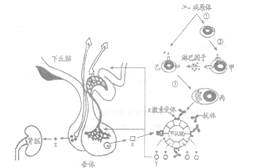问题
填空题 案例分析题
下图是人体生命活动部分调节示意图,其中甲~丙表示细胞,①~③表示相关过程,X~Z表示相关激素。

病原体经过过程①的()后,进行过程②:()。
答案
参考答案:吞噬细胞等的摄取和处理,暴露出该病原体所特有的抗原;将抗原传递给T细胞
下图是人体生命活动部分调节示意图,其中甲~丙表示细胞,①~③表示相关过程,X~Z表示相关激素。

病原体经过过程①的()后,进行过程②:()。
参考答案:吞噬细胞等的摄取和处理,暴露出该病原体所特有的抗原;将抗原传递给T细胞